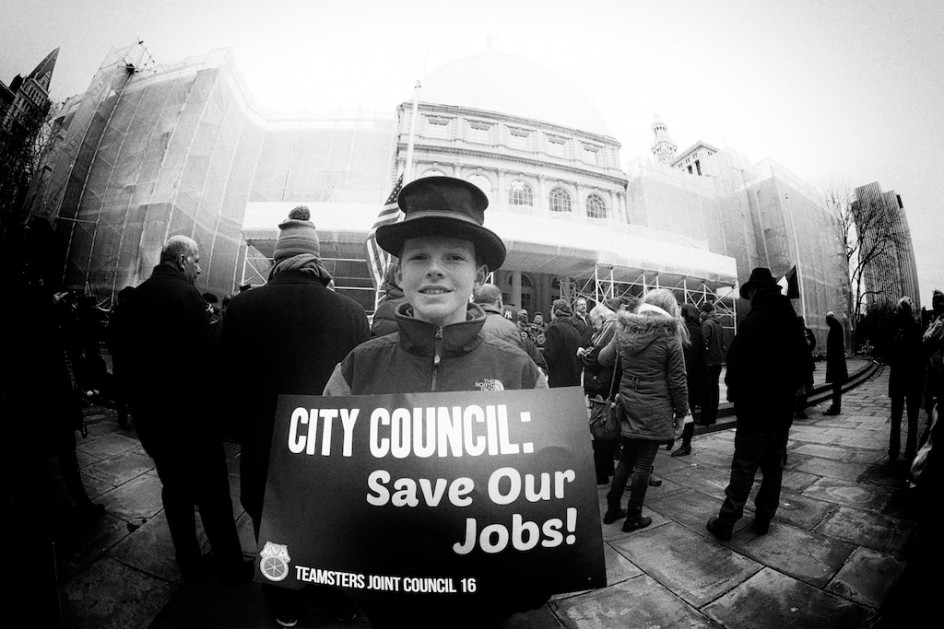
There was a moment during the animal rights rally I attended – the purpose was to support the destruction of the carriage trade in New York – when one of the speakers said the ban was a “win-win” situation for everybody. She was from PETA. The carriage horses would all be set free to graze and socialize with one another, she said, the carriage drivers would all have jobs driving those ugly green taxis in the Bronx and Brooklyn and Queens.
“They have no reason to complain,” said the speaker, “it’s all arranged, they’ll all have jobs.”
Since I know that neither of this statements is true – it is far from certain that there are places for the horses to go, and there are many licensing issues that would keep the drivers out of those green cars, even if a single one would want to drive one. It was yet another of those surreal moments. Is a cab the same thing as a horse carriage?
I looked around at the 30 or so reporters recording these statements and taking notes, and I felt a bit discouraged at the failure of most journalists in New York to seek out the truth about the carriage trade controversy or to try and tell it.
I am a writer now, not a reporter, but I could barely keep my mouth shut, even thought everybody else did. At that moment, the speaker locked her eyes onto me, and I knew she recognized me. I saw the anger and contempt in her eyes.
If I had spoken, I would have said that the people speaking do not know anything about the carriage drivers, and how could they, none of them have ever spoken to a single one of them or visited them at their work. The carriage trade is not just a job, it is a culture, a tradition, a way of life.
It is an immigrant culture, founded primarily by people from poor countries who grew up around horses, and whose parents and grandparents most often worked and lived with horses. This work is often passed on from one generation to another, the carriage drivers talk of this broken chain of dreams, they dare not pass it onto their children and grand-children, that has already been taken from them and cannot be returned.
The carriage drivers are America, really. Standing in line with the carriage drivers, waiting to be admitted into the City Hall plaza, I heard Irish brogues, Italian, Carribean dialects, the gutteral twangs of the Bronx and Brooklyn, Long Island and New Jersey. They are not “random people,” as one animal rights leader called them. They are very real people. They came with their families, their sons and their daughters.
The carriage trade is about family and community, about old, sometimes ancient connections to animals, it about freedom from the corporate shackles so many Americans find themselves in, the freedom of individuals to work outdoors, to interact with people who see romance and magic in the world – there was none in the animal rights rally I attended, just grim anger and false claims of morality and a smug kind of righteousness. I’m not sure who these people are, they clearly are not about the rights of animals.
I know by now that the animal rights people pushing the carriage ban know nothing about horses or the people who drive them, but I was surprised to see that the reporters crowded around me didn’t either. It’s not hard to see that the people in the carriage trade are individuals, creatives in many senses of the term. There are poets and dreamers and musicians and animal lovers and Irish blarney-spouters and students, many drawn to the culture and lifestyle of the individual.
How dare these people, I wonder, and their mayor, presume that they can simply pretend they can push all of these people out into green cabs in the outer boroughs and then lie to the world by claiming everyone has won? What kind of journalist listens to this mush with a straight face and passes it along for truth?
I am not a spouter of patriotic slogans, not a flag waver, but this is a country built in the idea of the freedom of the individual, the right to pursue our own culture, our own values, our own traditions and way of life. All we have to do is stay within the law and not harm others, and that is what the people in the carriage trade have done.
Traditions and rituals are important, often considered sacred. They bind us to one another, to our past and our future. The shape and burnish our souls and memories. This effort to ban the carriage trade is not just about jobs, despite the signs carried during the rally today. It is about so much more than that. When you see them, you see their love of the horses, but more than that, you see the love of their lives and their work. That is precious, that is not for anyone to take from them without cause or reason.
There is so much more at stake here than jobs.
